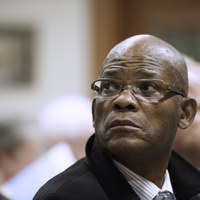Dullah Omar Institute statement on the passing of Dr Zola Skweyiya
Zola Sidney Themba Skweyiya was born in Simonstown on April 14 1942. He attended high school at Lovedale High in Alice where he joined protests against the introduction of Bantu Education and joined the ANC in 1956. After matriculating in 1960, he became active in the ANC, mobilising support for Umkhonto we Sizwe. In 1962, he went into exile, received military training and worked for the ANC in various capacities.
He studied law in the German Democratic Republic and obtained an LLD at the University of Leipzig in 1978. Dr Skweyiya represented the ANC at various international institutions and fora, such as the United Nations Human Rights Commission (1984 - 1993) and the Organisation of African Unity (1982 – 1985). In 1985 he was recalled to Lusaka to set up the ANC Legal and Constitutional Department and he chaired the ANC Constitution Committee from 1985 to 2000.
In 1990, he returned from exile and was invited by the then Vice-Chancellor of the University of the Western Cape, Prof Jakes Gerwel, to join the Community Law Centre that had just been founded by Adv Dullah Omar. As chair of the ANC’s Constitution Committee, he worked with colleagues at the Community Law Centre such as Albie Sachs, Brigitte Mbandla, Bulelani Ngcuka and Kader Asmal and set up the Centre for Development Studies.
During the constitutional negotiations, the Community Law Centre was “the engine room of the intellectual foundation for the new Constitution” as Albie Sachs put it. Dr Skweyiya’s leadership of the ANC Constitution Committee was fundamentally important to the Centre’s work to conduct research in support of the constitution making process. He himself published papers such as “Rooting Democracy on African Soil” and “Chieftaincy, the Ethnic Question and the Democratisation Process in South Africa”. These, and many other papers fed directly into the negotiations for a democratic South Africa.
Dr. Skweyiya was elected to Parliament in 1994 and joined President Mandela’s Cabinet as Minister of Public Service and Administration in the same year. He was moved to the position of Minister of Social Development under President Thabo Mbeki in 1999. In that capacity, he was responsible for the rollout and expansion of an unconditional Child Support Grant. The Child Support Grant has been widely credited as one of government’s most important and, arguably successful, strategies to reduce poverty.
After 15 years in the Cabinet and Parliament, his retirement from both was announced on 6 May 2009, following the April 2009 general election. Dr Zola Skweyiya was then appointed by President Zuma to represent South Africa as High Commissioner to the United Kingdom and Northern Ireland, a position he held until his retirement in 2014.
In 2015, Dr Skweyiya returned to UWC to take part in celebrating the Community Law Centre’s 25th Anniversary and its renaming into the Dullah Omar Institute. In his address, he warned against the corruption of politics and society for the benefit of the few. He urged those in power to use their positions and influence not for their own benefit but to improve the well-being of all South Africans.
Dr Skweyiya was wise, principled and humble and his loss means that we must say farewell to another giant of the struggle for liberation.
The Dullah Omar Institute extends its deepest condolences to Dr Skweyiya’s family and everyone who held him dear.
Prof Jaap de Visser, Director
Prof Nico Steytler, South African Research Chair in Multilevel Government, Law & Policy

